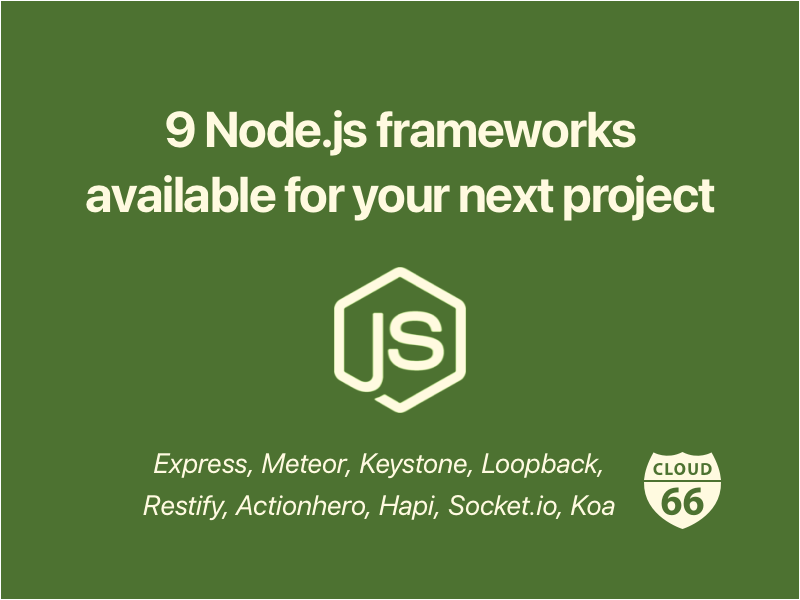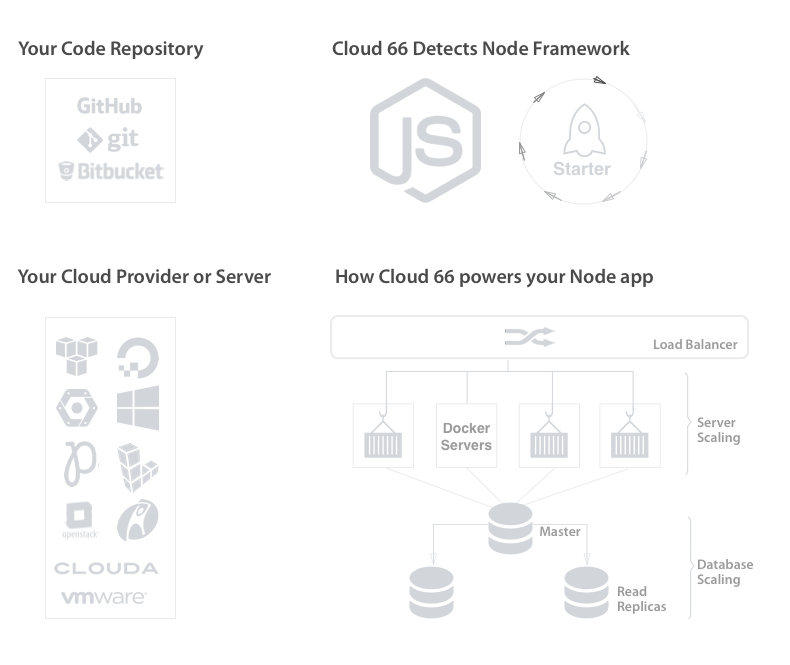
This blog post is focused on the Node.js frameworks, that you can use for your next project from Cloud 66 for Node portfolio. It explores the benefits of using Node.js, including a mini-overview of Cloud 66 for Node and provides a short description of each Node framework.
Node.js
Node.js was created in 2009 by Ryan Dahl. It's an open source, cross-platform runtime environment for developing server-side and networking applications, that was built on Google Chrome V8 JavaScript Engine. It allows you to do everything that you can do with Ruby or PHP by using JavaScript in Node.js.
Node. js is trusted by companies like Netflix, Groupon, PayPal, LinkedIn, Uber, eBay and more. Find out more on who is using Node.js from StackOverflow Survey.
Why developers love Node.js?
This is a short list of the reasons why developers would choose Node.js to develop their applications.
Fast: The V8 Google Engine empowers Node.js to provide a fast release cycle. This makes reading and writing to network connections, filesystems and to the database super fast.
Real-time: The power of websocket protocol allows easy and quick communication between client and server. It's instant and is ideal for real-time applications, like chat or games.
Flexible: Developers can use the same language for client-side, server-side, back-end and front-end for their applications (this can be carried out all at the same time). It offers an end-to-end solution.
Cross-platform support: Node.js runs virtually on any operating system. This makes Node.js portable, and your application is able to support a wide user audience.
Threading: Node.js operates on a single thread, using non-blocking I/O calls, that supports tens of thousands of concurrent connections. The downside of the single thread is no support for vertical scaling. (But Cloud 66 covers that)
Event loop: Instead of processes or threads, Node.js uses an event loop for scalability. The server automatically enters the event loop at the end of the callback definition.
Community: Node.js is supported by the strong, diverse, active and rapidly expanding hipster community. Developers share, make feature requests and upload packages and bug fixes using Git.
Developers love Node.js as it connects the ease of a scripting language (JavaScript) with the power of Unix network programming with the choice of a wide range of powerful frameworks.
Node Frameworks
I've provided a brief description of each Node framework supported by Cloud 66. From a usability perspective, I've cross-referenced it with Github to determine the number of stars and contributors. The information was verified on 30th November, and therefore is likely to have increased since then.
Based on the application functionality I've categorized Node frameworks into three types: API, full-stack and Sinatra-like.
API
The following frameworks are heavily API-driven and are ideal for fast deployment of Node.js API servers.
#1 Actionhero
This is a fast, lightweight and multi-transport API Server for Node.js that is ideal to create an easy to use toolkit to make reusable and scalable APIs.
Actionhero delivers high-end support (e.g. integrated via JSON) but also works on a low-level (e.g. communicating with TCP protocols). It's cluster-ready, with built-in support for background tasks, zero downtime deployment and it delivers like a CDN without a need to run Apache or Nginx.
Actionhero:
Github stars:1,499
Github contributors: 67
#2 Loopback
This is a highly extensible API framework created by IBM, that allows you to create dynamic end-to-end REST APIs with very little coding. It complements Express framework by making an easy API tool for developers.
Loopback API's can connect devices and integrate with Android, iOS and AngularJS SDKs to create client apps. For the graphical edition of the application, Loopback uses StrongLoop Arc.
Loopback:
Github stars: 7,817
Github contributors: 80
#3 Restify
This is a lightweight framework created to build REST APIs. It is a server-side framework for serving up data through API. Restify focuses on debugging and profiling that would allow you to optimize your server.
Restify:
Github stars: 5,966
Github contributors: 142
#4 Socket.io
The aim of this framework is to support real-time web applications (e.g. document collaboration and data exchange). Socket.io allows event-driven communications between web clients and servers; and it works like a client-side library in the browser, it also has a server side library for Node.js.
Socker.io:
Github stars: 28,887
Github contributors: 123
Full Stack
The following frameworks focus on full-stack support. They cover every step of the application’s development, from middleware and UIs to APIs and database integration.
#5 Meteor, Newly added to Cloud 66
This is a model-view controller (MVC) framework for building a real-time web application, that constantly synchronize with the server. It's in-built set of pre-written, self-contained modules supports writing application codes.
Applications build with Meteor can be run on OS X, Windows and Linux operating systems. It is an opinionated framework.
Meteor:
Github stars: 36,081
Github contributors: 321
#6 Keystone
This framework is ideal for database driven web applications and APIs, where Express, MongoDB and Mongoose are key components of the Node stack.
Keystone:
Github stars: 8,352
Github contributors: 181
Sinatra Like
The following are the lightweight frameworks that in their functionality mirror Ruby, the Sinatra framework.
#7 Express
It's fast, unopinionated, minimalist and an efficient middleware routing framework. Express is one of the most essential Node frameworks and is ideal for building the web/mobile applications and APIs.
Express:
Github stars: 28,683
Github contributors: 192
You can also read: 'How to deploy RESTful APIs using Node, Express 4 and Docker'.
#8 Koa
This is a callback-less, lightweight middleware framework, that allows you to write web applications and REST APIs. You can also add new features and customize anything along the path. It supports ES6 and the latest JavaScript release.
This is not the best framework for a first-time user as it has its additional methods to learn.
Koa:
Github stars: 12,779
Github contributors: 91
#9 Hapi
This framework is ideal for rapid builds and the API tests, but you can also build the full website with Hapi. It has a great collection of plugins that enables it to be worked on in sections without breaking the rest of the code base. Great for teamwork projects.
As Hapi was created by Walmart developers, it offers an enterprise-level functionality.
Hapi:
Github stars: 7,015
Github contributors: 151
How Cloud 66 for Node works?
To deploy your Node app at Cloud 66 you need to:
- connect your code repository;
- connect with your cloud provider or private server;
- and then deploy!
How it works
We detect the framework of your Node applications with Starter -our open source project, that generates application composition files. It scans your application and returns the type of framework you use and will let you know if the framework is supported by Cloud 66. Additionally, under-the-hood we power your application by Cloud 66 containers (including Habitus.io and BuildGrid) without you having to deal with the complexity of docker.
Once your Node app is set up and running you have access to a wide range of tools and features that support and maintain an end-to-end application, from code to deployment and application management. It's easy to scale and at the click of a button you can increase your backend Node application servers, add a load balancer to distribute traffic or a database backup for guaranteed availability.
Why don't you take Cloud 66 for Node for a spin with our 2 weeks free trial? To get you started watch the video below on how to build your Node stack in 3 easy steps:
Blog Post: Migrate your Node app to Cloud 66;
Help Page: Deploy Node framework that is not available at Cloud 66;
